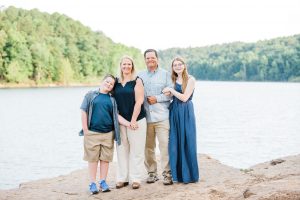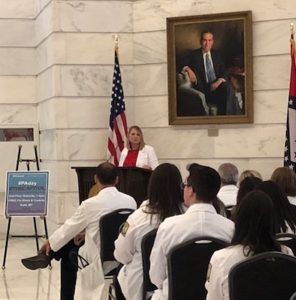Distinguished Fellow Tara Bruner Helps Advance Profession in Arkansas
PA Gives Time and Effort to Help All PAs Succeed
November 17, 2021
By Jennifer Walker
Have you seen the DFAAPA credential after a colleague’s name and wondered what it meant? This credential is an honor given to AAPA’s Distinguished Fellows, PAs who are dedicated to advancing the profession through volunteer work, advocacy, mentoring, education, and more.
“It’s a title that says, ‘I value the PA profession, and I want to give my time and effort to see all of us succeed,’” says Tara Bruner, MHS, PA-C, DFAAPA, who earned the designation in 2018. As of August 2021, AAPA has recognized 1,009 PAs as Distinguished Fellows.
PAs who want to apply for this designation need to submit an application along with documentation of achievements and participate in an interview. After acceptance, they then commit to an area of impact in which they plan to continue to be involved in advancing the PA profession.
To give examples of what is possible through making this commitment, AAPA talked to three PAs—Bruner; Rick Rohrs, PA-C, DFAAPA; and Julie Theriault, PA-C, DFAAPA—about how they are making lasting impacts on the profession locally, nationally, and internationally. This is the first in a series of articles and highlights Bruner.

Advancing the PA Profession in Arkansas
When Tara Bruner moved from Oklahoma to Searcy, Arkansas, in 2008, she knew she was going to a state that was in the early days of embracing the PA profession. Bruner accepted a faculty position at Harding University, which is one of only two PA programs in the state.
Throughout the state, there are 491 certified PAs, which means Arkansas is ranked 50 out of 50 states and the District of Columbia for the number of PAs per 100,000 people, according to a 2019 report from the National Commission on Certification of Physician Assistants (NCCPA). In contrast, Oklahoma, where Bruner had worked in bariatric surgery and general surgery, has 1,622 PAs and is ranked 30 in the same report.
“I saw a big gap [between Oklahoma and Arkansas] because Arkansas was a young state for PAs,” says Bruner, who began her career in medical research at the Oklahoma Medical Research Foundation. “I still see in my practice and with people in the community that [many of them] don’t know what a PA is. So we have a lot of work to do in Arkansas.”
But this has also motivated Bruner to get involved to advance the profession in her state. Most of the faculty members at Harding University were involved with the Arkansas Academy of Physician Assistants (ARAPA), so Bruner joined the Board of Directors as the treasurer from 2009-10. For three years, she planned ARAPA’s annual CME meeting, a role that included securing a venue and speakers, obtaining accreditation through AAPA, organizing registration, and more, for 50 to 75 attendees. And from 2011 to 2020, she held a presidency role, whether it be president-elect, president, past president, or vice president.
Stay connected to your PA community – join or renew your membership today

During Bruner’s tenure with ARAPA, which still continues today, many advancements to the PA profession have been made in Arkansas. Through a grant from AAPA, ARAPA secured a lobbyist to advocate for the PA profession, which ultimately led to the passing of S.B. 152 in July 2021. This bill gives PAs a seat on the Arkansas Medical Board, allowing them to have a voice and representation, and allows PAs to prescribe medications in accordance with other advanced practice providers, pronounce death, and volunteer in the case of disasters or emergencies.
Benefits of volunteering
“I’ve experienced the benefits of volunteer work,’” says Bruner, who currently works as a clinical educator with Thermo Fisher Scientific, a company that manufactures a variety of medical products. “It is time consuming and exhaustive, but when you see things change and you can see that PAs are strengthening in your state, it makes it all worth it.”
From 2014 to 2017, Bruner had the opportunity to begin working on the national level when she was asked to volunteer on AAPA’s Commission on Continuing Professional Development and Education. In this role, Bruner and the other PA volunteers helped select speakers for AAPA’s annual conference. Bruner also volunteered during the conference, where she made sure everything ran smoothly with the speakers and the participants in her assigned territory.
It was around this time that Bruner knew she wanted to be a Distinguished Fellow. She joined the one or two other PAs in Arkansas who had the DFAAPA credential in 2018. “Once I had that first experience working with AAPA, I realized its value and benefit to us as PAs and wanted to stay involved,” she says. “In the PA world and with our colleagues, I feel [the Distinguished Fellows designation] holds a lot of value and respect.”
Jennifer Walker is a freelance writer in Baltimore, MD. Contact Jennifer at [email protected].
You May Also Like
AAPA’s Distinguished Fellows: How to Apply and Meet the Honorees
Distinguished Fellows Share Motivations for AAPA Recognition
PA Susann Galloway: Determined, Devoted, and Distinguished
You’ve Got This: Become a Distinguished Fellow
Thank you for reading AAPA’s News Central
You have 2 articles left this month. Create a free account to read more stories, or become a member for more access to exclusive benefits! Already have an account? Log in.



